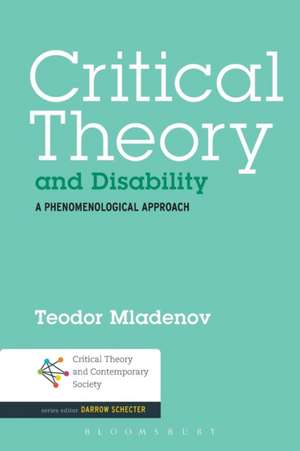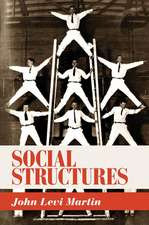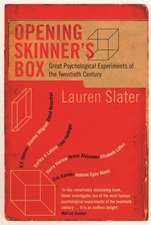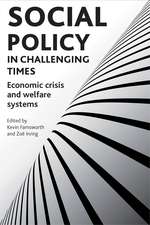Critical Theory and Disability: A Phenomenological Approach: Critical Theory and Contemporary Society
Autor Teodor Mladenoven Limba Engleză Paperback – 29 iun 2016
| Toate formatele și edițiile | Preț | Express |
|---|---|---|
| Paperback (1) | 256.59 lei 6-8 săpt. | |
| Bloomsbury Publishing – 29 iun 2016 | 256.59 lei 6-8 săpt. | |
| Hardback (1) | 773.81 lei 3-5 săpt. | |
| Bloomsbury Publishing – 11 feb 2015 | 773.81 lei 3-5 săpt. |
Din seria Critical Theory and Contemporary Society
-
 Preț: 208.70 lei
Preț: 208.70 lei -
 Preț: 345.05 lei
Preț: 345.05 lei -
 Preț: 155.55 lei
Preț: 155.55 lei -
 Preț: 206.64 lei
Preț: 206.64 lei -
 Preț: 177.90 lei
Preț: 177.90 lei - 23%
 Preț: 512.25 lei
Preț: 512.25 lei - 23%
 Preț: 536.91 lei
Preț: 536.91 lei - 23%
 Preț: 537.00 lei
Preț: 537.00 lei - 12%
 Preț: 278.94 lei
Preț: 278.94 lei - 22%
 Preț: 257.21 lei
Preț: 257.21 lei -
 Preț: 278.32 lei
Preț: 278.32 lei - 13%
 Preț: 255.29 lei
Preț: 255.29 lei - 22%
 Preț: 832.65 lei
Preț: 832.65 lei - 31%
 Preț: 771.26 lei
Preț: 771.26 lei - 22%
 Preț: 889.88 lei
Preț: 889.88 lei -
 Preț: 237.75 lei
Preț: 237.75 lei - 13%
 Preț: 254.75 lei
Preț: 254.75 lei
Preț: 256.59 lei
Preț vechi: 330.71 lei
-22% Nou
Puncte Express: 385
Preț estimativ în valută:
49.10€ • 52.50$ • 40.94£
49.10€ • 52.50$ • 40.94£
Carte tipărită la comandă
Livrare economică 17 aprilie-01 mai
Preluare comenzi: 021 569.72.76
Specificații
ISBN-13: 9781501322167
ISBN-10: 1501322168
Pagini: 232
Dimensiuni: 152 x 229 x 19 mm
Greutate: 0.32 kg
Ediția:NIPPOD
Editura: Bloomsbury Publishing
Colecția Bloomsbury Academic
Seria Critical Theory and Contemporary Society
Locul publicării:New York, United States
ISBN-10: 1501322168
Pagini: 232
Dimensiuni: 152 x 229 x 19 mm
Greutate: 0.32 kg
Ediția:NIPPOD
Editura: Bloomsbury Publishing
Colecția Bloomsbury Academic
Seria Critical Theory and Contemporary Society
Locul publicării:New York, United States
Caracteristici
Offers suggestions for overcoming the theory/practice divide by applying philosophically informed analysis to social policy issues
Notă biografică
Teodor Mladenov has a PhD in Sociology of Disability from King's College London. He has published articles in Disability & Society, Critical Social Policy and Alter - European Journal of Disability Research, and has worked for many years as a researcher for disabled people's organisations and international NGOs operating in Bulgaria.
Cuprins
ACKNOWLEDGEMENTS CHAPTER 1: INTRODUCTION CHAPTER 2: THE BODY CHAPTER 3: DISABILITY ASSESSMENT CHAPTER 4: PERSONAL ASSISTANCECHAPTER 5: DISCRIMINATION CHAPTER 6: MEDIA REPRESENTATIONS OF INACCESSIBILITY CHAPTER 7: SEXUALITY 257CHAPTER 8: THE UN CONVENTION ON THE RIGHTS OF PERSONS WITH DISABILITIES CHAPTER 9: CONCLUSIONSBIBLIOGRAPHY INDEX
Recenzii
In this wonderfully affirmative appeal to the power of social theory and philosophy, Teodor Mladenov has written a book that carefully exposes the existential-ontological dimensions of disablism whilst, simultaneously, opening up a space for positively re-imagining and re-valuing different ways of being human. This is a potent reminder that activism and theory work together at the levels of the society and the self.
This extremely original and innovative book brings perspectives of existential phenomenology and critical theory to bear on disability studies. Clearly and confidently argued, it is a major contribution to the field.
Teodor Mladenov uses phenomenological philosophy and a carnal approach to sociology in order to focus scholarly attention on what it means to be human and how negative ontologies derived from dis/ableist sentiments and practices undermine and invalidate disabled peoples claims to membership of the human community. Through closely argued case studies of disabled peoples experience of life in his native Bulgaria - including, for example, in depth discussions of personal assistance, disability assessment and media representations - Mladenov introduces disability studies to its philosophical soul.
A must read. By exploring contemporary Bulgaria's conceptual and institutional relations with disability, Teodor Mladenov has written an intriguing phenomenological analysis of embodiment. More intriguing still, Mladenov provides a convincing demonstration of the significance of disability to the lingering question of what it means to be human.
This extremely original and innovative book brings perspectives of existential phenomenology and critical theory to bear on disability studies. Clearly and confidently argued, it is a major contribution to the field.
Teodor Mladenov uses phenomenological philosophy and a carnal approach to sociology in order to focus scholarly attention on what it means to be human and how negative ontologies derived from dis/ableist sentiments and practices undermine and invalidate disabled peoples claims to membership of the human community. Through closely argued case studies of disabled peoples experience of life in his native Bulgaria - including, for example, in depth discussions of personal assistance, disability assessment and media representations - Mladenov introduces disability studies to its philosophical soul.
A must read. By exploring contemporary Bulgaria's conceptual and institutional relations with disability, Teodor Mladenov has written an intriguing phenomenological analysis of embodiment. More intriguing still, Mladenov provides a convincing demonstration of the significance of disability to the lingering question of what it means to be human.












